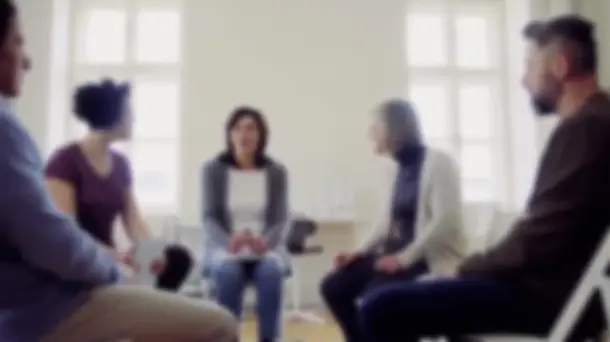Welcome to Narcotics Anonymous
What is our message? The message is that an addict, any addict, can stop using drugs, lose the desire to use, and find a new way to live. Our message is hope and the promise of freedom.

“When new members come to meetings, our sole interest is in their desire for freedom from active addiction and how we can be of help.”
It Works: How and Why, “Third Tradition”
Is NA for me?
This is a question every potential member must answer for themselves. Here are some recommended resources that may be helpful:
Need help for family or a friend?
NA meetings are run by and for addicts. If you're looking for help for a loved one, you can contact Narcotics Anonymous near you.
Subscribe to NAWS Emails
Sign up to receive Just for Today and SPAD daily meditation emails, as well as NAWS News, NAWS Updates, and more.
Never before have so many clean addicts, of their own choice and in free society, been able to meet where they please, to maintain their recovery in complete creative freedom.
Basic Text, “We Do Recover”
Recovery Quicklinks:
Service Quicklinks:
Narcotics Anonymous sprang from the Alcoholics Anonymous Program of the late 1940s, with meetings first emerging in the Los Angeles area of California, USA, in the early Fifties. The NA program started as a small US movement that has grown into one of the world's oldest and largest organizations of its type.
Today, Narcotics Anonymous is well established throughout much of the Americas, Western Europe, Australia, and New Zealand. Newly formed groups and NA communities are now scattered throughout the Indian subcontinent, Africa, East Asia, the Middle East, and Eastern Europe. Narcotics Anonymous books and information pamphlets are currently available in 49 languages.
Information About NA
Daily Meditations
Just for Today
March 04, 2026 |
The process |
| Page 66 |
| “This program has become a part of me… I understand more clearly the things that are happening in my life today. I no longer fight the process.“ |
| Basic Text, p. 127 |
| In active addiction, things happened seemingly without rhyme or reason. We just “did things” often without knowing why or what the results would be. Life had little value or meaning. The Twelve Step process gives meaning to our lives; in working the steps, we come to accept both the dark and the bright sides of ourselves. We strip away the denial that kept us from comprehending addiction's affect on us. We honestly examine ourselves, picking out the patterns in our thoughts, our feelings, and our behavior. We gain humility and perspective by fully disclosing ourselves to another human being. In seeking to have our shortcomings removed, we develop a working appreciation of our own powerlessness and the strength provided by a Power greater than we are. With our enhanced understanding of ourselves, we gain greater insight into and acceptance of others. The Twelve Steps are the key to a process we call “life.” In working the steps, they become a part of us and we become a part of the life around us. Our world is no longer meaningless; we understand more about what happens in our lives today. We no longer fight the process. Today, in working the steps, we live it. |
| Just for Today: Life is a process; the Twelve Steps are the key. Today, I will use the steps to participate in that process, understanding and enjoying myself and my recovery. |
A Spiritual Principle a Day
March 04, 2026 |
Connecting with Our Creativity and Higher Power |
| Page 66 |
| “Living fully is a creative expression of love for our Higher Power. To be fully alive, awake, and honest about who we are is a gift to us and from us.“ |
| Living Clean, Chapter 3, “Creative Action of the Spirit” |
| The longer we stay clean, the richer our lives become. We pursue our passions and take them where they lead us. For some of us, that means we go to school, launch careers, and start families. Others fall in love, serve our communities, and finally have time to plant a garden or take a road trip. The journey to unearth these passions–whatever they may be–is like an archeological dig. We excavate our personal creativity, an attribute long lost and forgotten, buried in the wreckage of our active addiction. Our relationship with a Higher Power gives us the courage to discover and embrace our true selves and give voice to our dreams. The journey through the Steps shapes our understanding of our Higher Power and ourselves. We learn who we are and who we're not and how to put one foot in front of the other to become who we want to be. We let go of old identities that no longer suit us. Our survival no longer depends on pushing people away. We're free to be our authentic selves and ready to explore all of the quirky weirdness that entails. We often find kindred spirits in the rooms, other members who are just as excited as we are about classic cars, comic books, yarn crafts, independent films, obscure festivals, or any other interest we can imagine. We are no longer merely surviving our circumstances. In fact, we are full of life and wide awake to experience all that the world has to offer. One of the greatest gifts in recovery is the ability to embrace ourselves for who we are and open our hearts to those around us. |
| ——— ——— ——— ——— ——— |
| I will explore opportunities to share myself in my NA community in creative ways and strengthen my relationship with my Higher Power in the process. |
Do you need help with a drug problem?
“If you’re new to NA or planning to go to a Narcotics Anonymous meeting for the first time, it might be nice to know a little bit about what happens in our meetings. The information here is meant to give you an understanding of what we do when we come together to share recovery…”
Subscribe to NAWS Emails
Sign up to receive NAWS Updates and NAWS News emails as well as Just for Today and SPAD daily emails.



